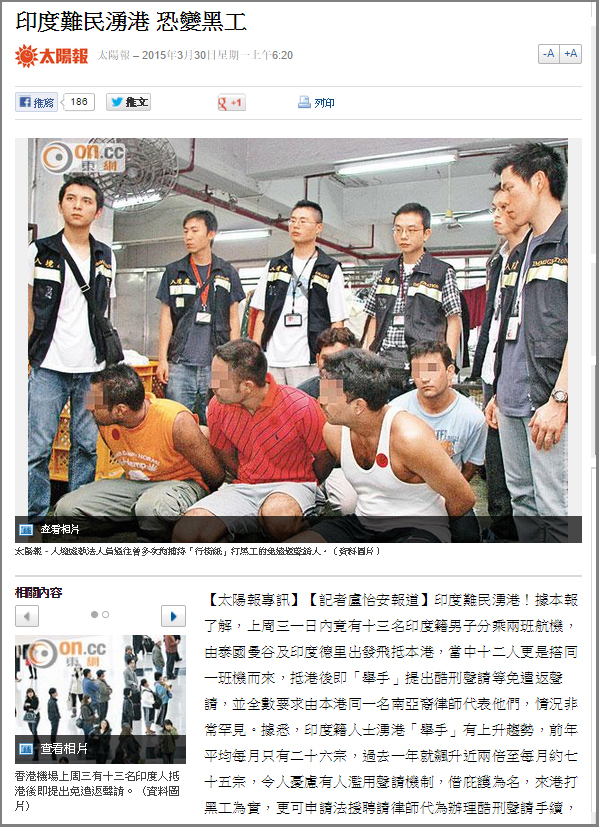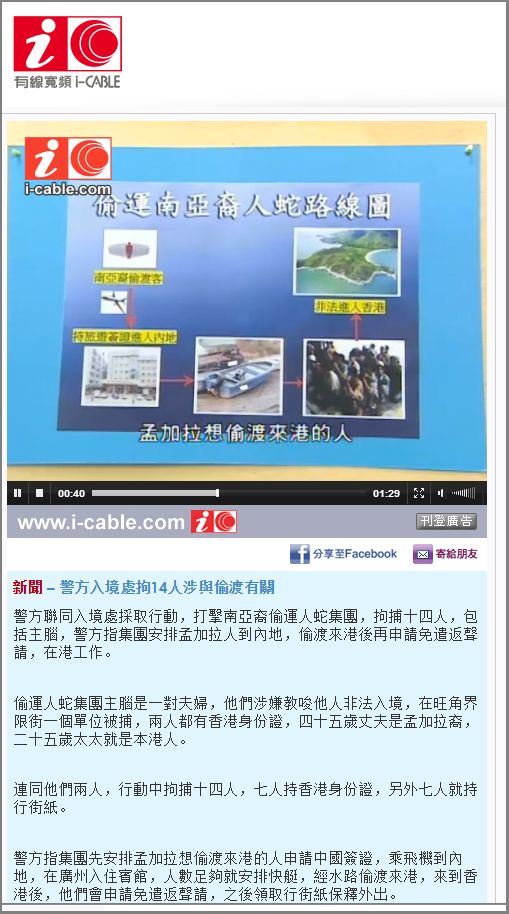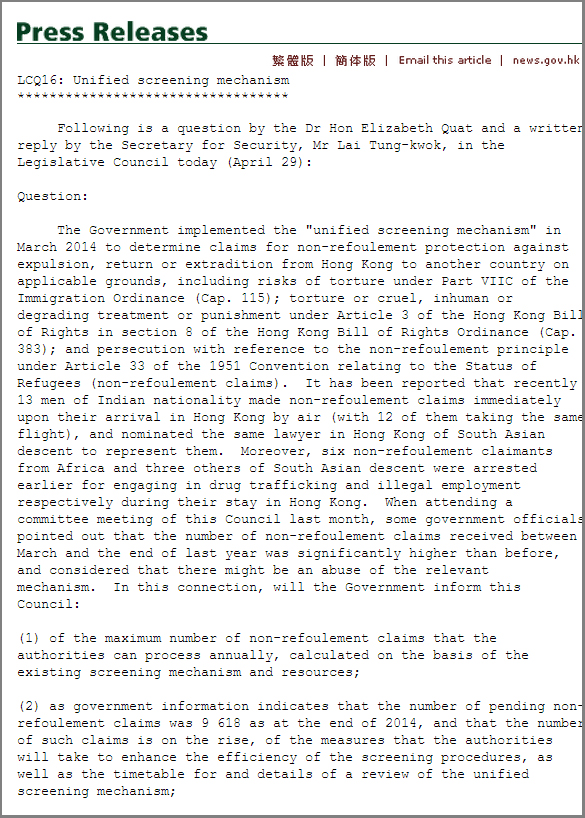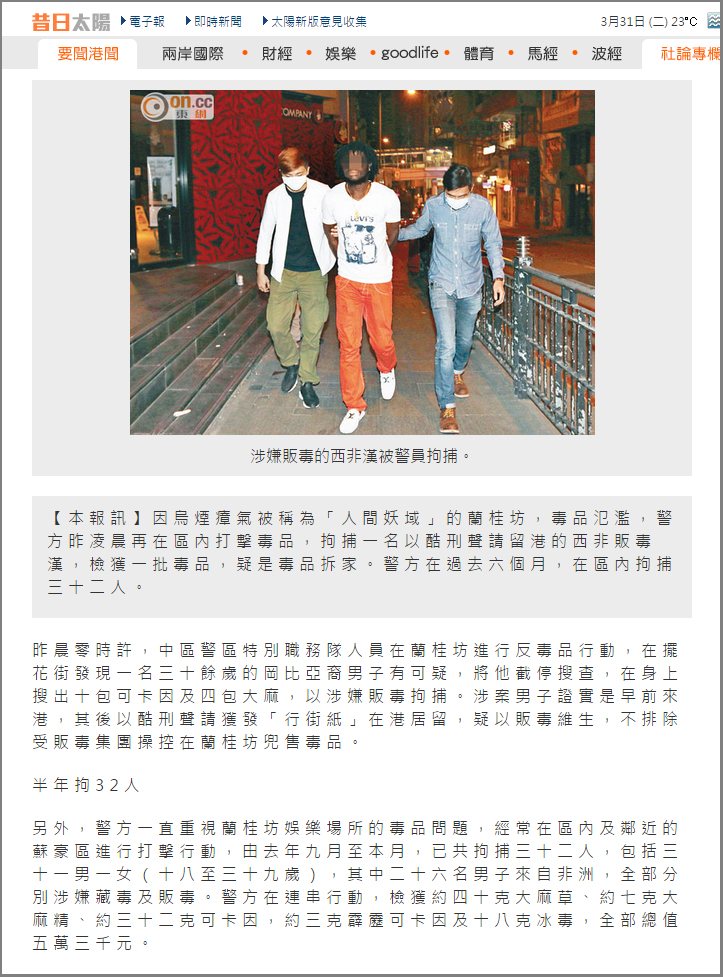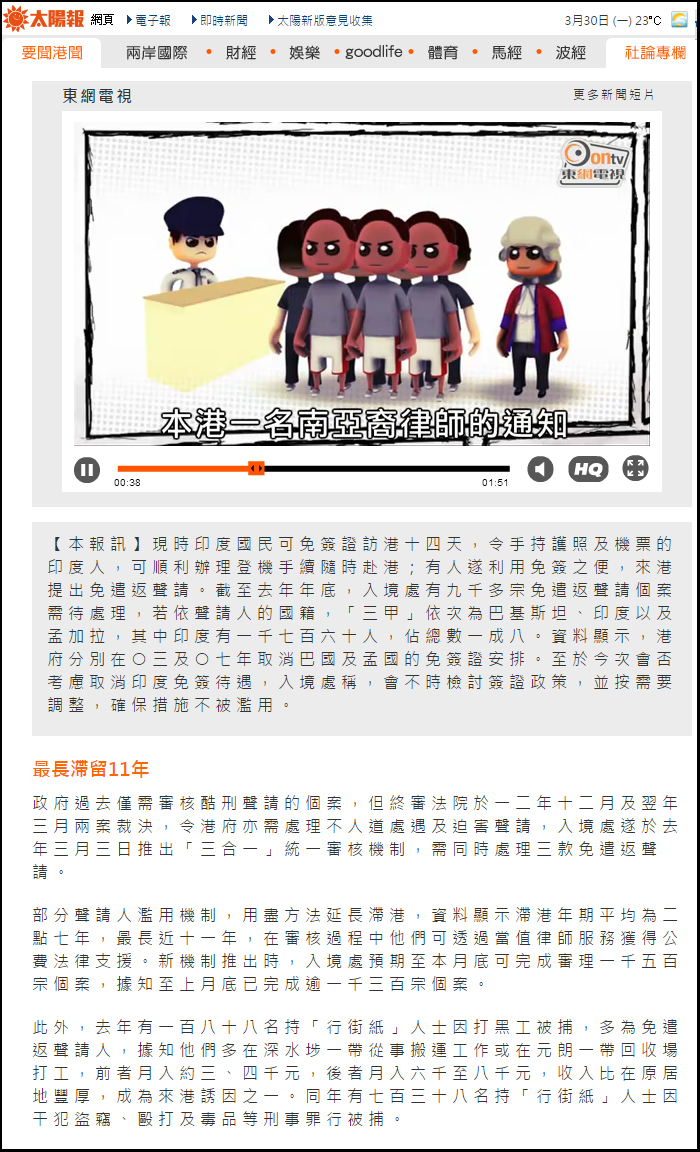Archive
Security Bureau update on the Unified Screening Mechanism
Apr 30th, 2015 | Crime, Detention, Government, Immigration, Legal | Comment
Welfare punishment is a doubtful deterrent
Apr 27th, 2015 | Crime, Housing, Legal, VF Report, Welfare | Comment
The Hong Kong government has a preference to describe asylum in negative terms: “Non-refoulement claimants in Hong Kong are illegal immigrants or overstayers, even if their claim is substantiated … they may not take up employment in Hong Kong; violation of the relevant provisions is a criminal offence punishable on conviction to a fine of up to level 5 ($50,000) or to imprisonment for three years … the sentencing guideline in respect of the relevant provision states that 15 months’ imprisonment should be imposed on a person convicted of an offence.” (Finance Committee 2015-16)
Very few lawyers stand apart for attaching the utmost importance to refugee rights and striving to ensure such rights are respected and safeguarded in the interest of the asylum community and the city’s reputation. The reality is that in most cases they have to represent clients pro bono.
In February 2014, barrister Robert Tibbo obtained leave to make an application for the judicial review of the torture claim of a South Asian woman whose appeal was dismissed without an oral hearing. Her council, a non-executive director of Vision First, argued that various factual matters relevant to the case had not been addressed by the adjudicator who cherry-picked country of origin information.
The woman sought refuge in Hong Kong in 2005 to escape from threats to her life and safety due to her political activities and the serious abuse she received from her husband affiliated to an opposing political party. As if her struggle for protection was not enough, a decade later she stood before the bench in Eastern Magistracy to answer to charges of working illegally.
In 2013, the woman was arrested by police at the back of a restaurant where she occasionally washed dishes for exploitative wages. For months she had paid cash for a dilapidated subdivided room, because the landlord refused to accept bank transfers from ISS-HK and she was unable to find alternative accommodation within the paltry rental budget that was then 1200 HK$.
It is not uncommon for refugees to rent the cheapest rooms from landlords who prefer cash payments to reporting bank transaction in income statements. In such cases tenants are obliged to secure cash somehow, or risk being homeless. Under the circumstances, the great majority of refugees seek employment in the informal economy and risk arrest, prosecution and jail for attempting to make ends meet.
Interestingly this woman’s situation ticks several failures in the current asylum policy: 1) denial of protection; 2) prolonged determination of claims; 3) prohibition from working, and 4) insufficient welfare assistance, which in this case included failure by ISS-HK to secure suitable accommodation for a vulnerable woman. Robert Tibbo is seeking a stay of prosecution arguing that systemic failures placed his client in a predicament in which she worked to avoid sleeping in the street.
At a hearing in April 2015, the magistrate suggested that a judicial review be sought against the Director of Immigration who sets the recognizance conditions, including the prohibition from taking up employment. The argument is that if the government openly met the basic needs of refugees and signed tenancy agreements, then refugees would not be compelled to work illegally.
Robert Tibbo explains, “This case is likely to go to the Court of Final Appeal. It is hardly unique since countless refugees struggle daily to pay necessary costs not met by ISS-HK. My client is a victim of an intentional failure by the Government to meet the basic needs of refugees who, when facing similar charges, often plead guilty to avoid stiffer sentences while cognizance that they were entrapped. This case has the potential of changing the system.”
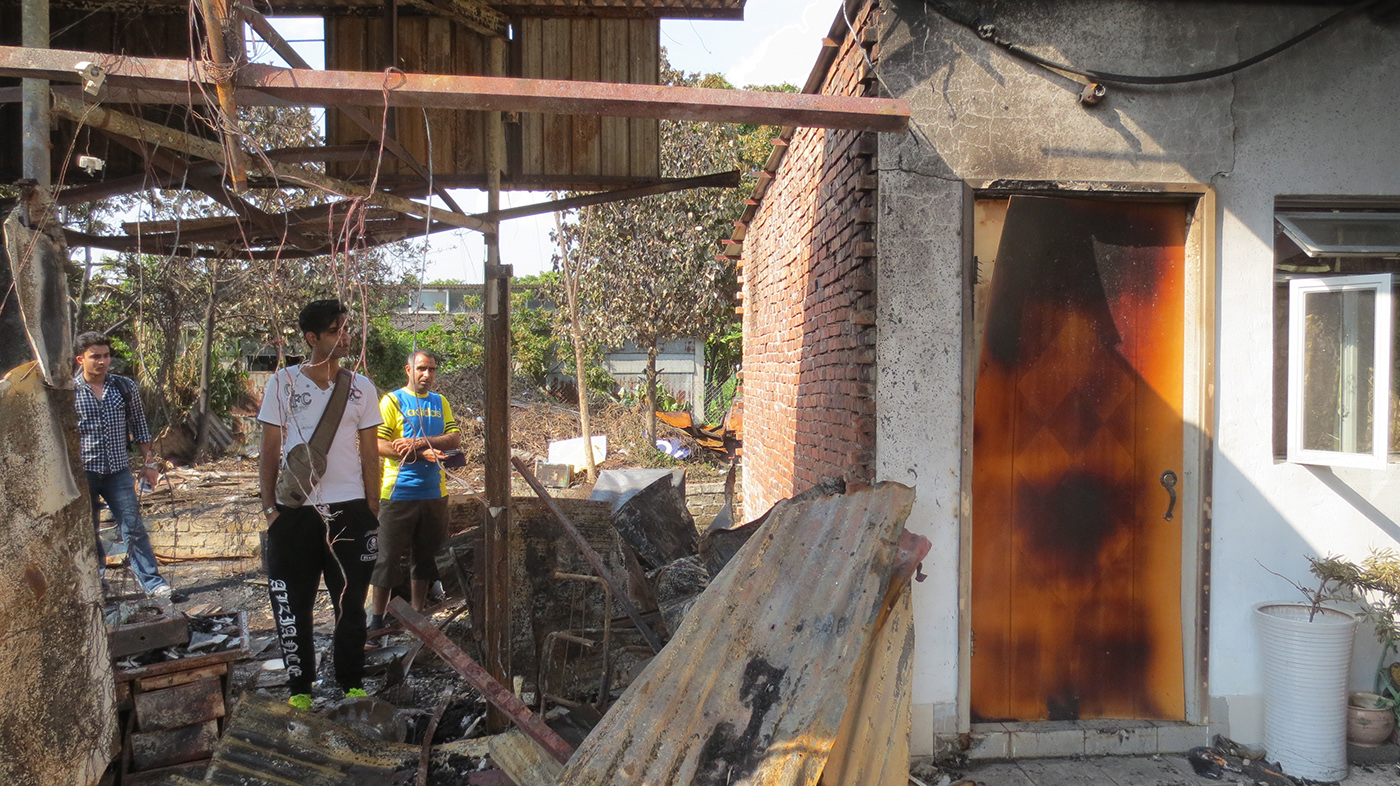
Is the government promoting “no welfare – no work” entrapment?
Apr 20th, 2015 | Crime, Detention, Immigration, VF Opinion, Welfare | Comment
Called to the stand in Shatin Magistracy, Mohammed faced charges of breaching conditions of stay by taking up employment unlawfully. With the assistance of a Hindi interpreter, the despairing 50 year-old listened carefully before entering a plea – NOT GUILTY!
Asylum seekers are most commonly tarred with one brush. Public opinion is almost unanimous in accusing them of beating a path to our city to fraudulently drink in its riches by abusing welfare assistance, or toiling in the underground economy. Obfuscating the truth, the authorities regularly promote to the inattentive a rejection rate of 99.9% as evidence that only 1 in 1000 claims is meritorious.
The government remains unyielding and is adamant that the asylum mechanism offers genuine claimants a fair chance. No explanation is given about cases that have been pending for years often stretching to a decade. At the other end of the spectrum are recent arrivals who presumably didn’t expect to suffer like beggars after lodging protection claims with the Hong Kong Government.
Everything was better in Mohammed’s life before he took refuge in our city. If he didn’t face danger, he wouldn’t have left behind a supportive wife and adult children, abandoning a comfortable home and a thriving family business. At half a century of age, he hardly fits the stereotype of an adventurer seeking a better life in a developed country where illegal work might support remittances home.
One night, a few months after being released from Immigration detention, Mohammed regained consciousness in a ward at Queen Elizabeth Hospital. “I didn’t know how I got there. I was feeling ill that morning as I hadn’t had anything to eat and I was exhausted by sleeping outside week after week. The nurse told me that I had hit my head when I collapsed in the street. An ambulance was called and I was admitted to hospital for three days until I recovered.”
Holding back tears, he finds it hard to continue, “Those were the only three days when I ate properly since I was released from CIC. The nurses gave me extra food to make me stronger. For several months before I only ate what shops donated to me in Chung King Mansions. It was never enough. I lost a lot of weight and was often sick. I was worried when discharged from hospital as I knew I would be hungry.”
Mohammed reported that he had registered at the Social Welfare Department and had been referred to ISS-HK, but nobody called him for months. He forgets how long it was because several months passed in a blur of destitution, begging for handouts, sleeping in the streets, falling sick and depressed and always struggling with hunger. As if life couldn’t get more distressing, it did.
One Ramadan afternoon before the Zuhr prayers, he was accosted by a faithful at the Kowloon mosque who, presumably noticing his grime state, inquired about his condition. Mohammed explained that he was a refugee and had long run out of money and support. The well-wisher showed concern and with the enticement of a ‘breaking fast meal’ invited him on a trip in a private car to a recycling yard in Lok Ma Chau. The arrangement did not raise the suspicions of a newcomer in an international city.
Beggars can’t be choosers and nothing seemed out of the ordinary for hungry Mohammed about Muslim faithful offering desperately needed support in the name of Zakat – charity being one of the five pillars of Islam and a special obligation during Ramadan. Nobody suspected that police commandos were concealed in nearby bushes cocking machine guns to raid the isolated yard.
Around 3:30pm, before Mohammed enjoyed a single morsel of food, armed police burst inside. In the ensuing chaos, the panic-stricken refugee dove inside a wrecked car hugging the rusty floor until he was dragged out by the collar of his jacket two hours later, sweaty and confused. The fact that he was hiding from enforcement agents was subsequently put forward as evidence of his guilt.
Mohammed stands accused of working illegally. The police took photos of those arrested after the raid, not when they were allegedly working. The threadbare clothes of a homeless existence were put forward as work clothes, though Mohammed had arrived an hour earlier and his hands were clean.
It is certainly possible that Mohammed is lying and had accepted an offer for work at a time of acute desperation. Perhaps Mohammed is afraid of admitting the truth for fear of being jailed for 15 months for working illegally. Perhaps it wasn’t the first time he went to that yard and the police had failed to take such photo. But he claims to be innocent. And this arrest consequently raises more questions than answers.
How much of a crime is it to steal bread when you are hungry? How are refugees expected to survive for weeks and months before receiving welfare? For that matter, refugees are trapped between inadequate assistance and cope without breaking the law. Is the government promoting “no welfare – no work” entrapment? In some jurisdiction offenders may be found innocent when authorities use deception to make arrests. Shouldn’t the courts take note of contextual evidence?
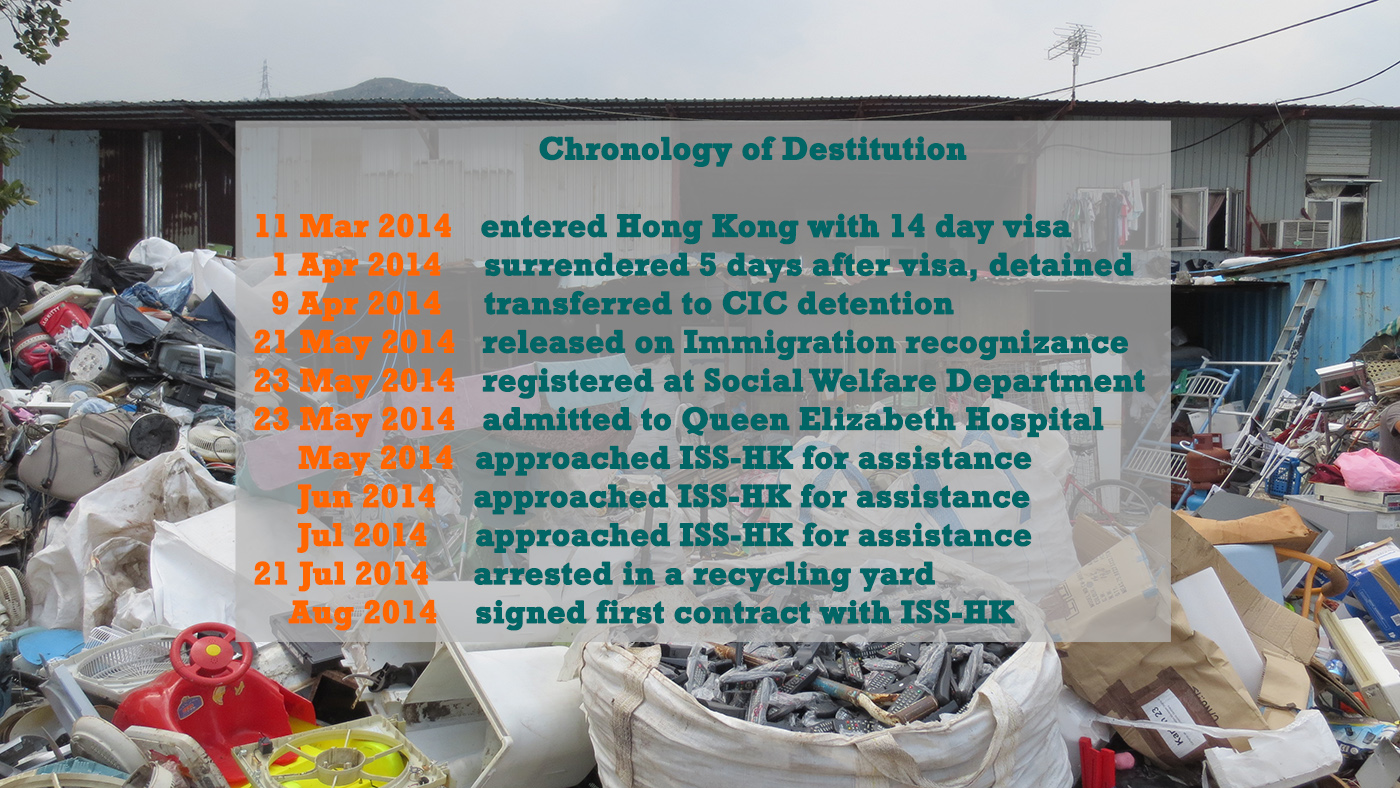
Residual welfare is formulated to entrap refugees
Apr 15th, 2015 | Crime, VF Opinion, Welfare | Comment
In pre-industrial, agrarian society the needs of the vulnerable were generally met by family, kinship provisions, neighbourhood, informal support networks, religious institution and the charity of the rich based on normative values of empathy, mutual help, locality ties and religious beliefs. The state offered no institutional assistance.
In modern times, these informal arrangements were admirably taken over by the state in the interest of “those who are not capable without help and support of standing on their own feet as fully independent or self-directing members of the community”. It was understood that “welfare addresses social needs accepted as essential to the well-being of a society. It focuses on personal and social problems, both existing and potential.” (HK Gov 1965 + 1991 White Papers).
Nonetheless, with 1.5 million citizens living in poverty, and thousands more struggling to afford three square meals a day, the Hong Kong welfare model is often considered an embarrassment. The administration falls short of fully mobilizing its considerable resources to alleviate the emotional and economic suffering of its most vulnerable citizens.
In reality, scholars tend to see local welfare as a residual system. That is welfare that only partly ameliorates the failures of the market economy, precisely because the privileges of the rich in society should not be undermined by a burdening tax system that is claimed would inevitably become needed were more services needed by larger numbers of welfare claimants.
After decades neglecting refugees, the government provided welfare in 2006. But the authorities persistently reiterate the service is “to prevent destitution while not creating a magnet effect which may have serious implications for the sustainability of our current support systems and for our immigration control.” In other words, this is another form of residual welfare.
But here is the catch. Uprooted from family, kinship and locality ties, refugees in Hong Kong are displaced and deficiently assisted by support networks, institutional services and charitable organizations. The assistance levels provided by the government condemn them to dire poverty that is compounded by the denial of work rights and 15 months imprisonment for those arrested working.
As opposed to a solidarity model based on principles of mutual responsibility, a residual welfare model offers a partial safety net confined to those who are unable to manage otherwise, with the assumption that they are able to locate further sources of assistance on their own. This notion then suggests that 10,000 refugees in Hong Kong ought to supplement inadequate government assistance through hand-outs from family, countrymen, neighbours, religious institutions and NGOs … or by working illegally.
Policies directed against the poor have to do with the government abdicating its duty to alleviate distress and poverty, as much as with crafting a hostile environment in which an undesirable foreign class adapts by resorting to all sorts of social tricks and risking arrest for doing something illegal because they have no choice. A case in point is a refugee who already has 5 convictions for theft. He candidly explains, “I steal baby formula because easy to sell. If police arrest me I go prison 2 to 3 months. If I am arrested working I will go prison for 2 years because of prior convictions.”
The expectation of self-reliance from refugees who frequently don’t know a soul in town is absurd. They report the absurdity of the residual welfare system through suggestions commonly made by their case workers:
– “You must wait 2 to 3 months before we start the assistance.”
– “We cannot help you. You must find the money yourself.”
– “You should ask some NGO to pay for or donate what you need.”
– “You should ask your friends to help you pay for it.”
– “You should find some church to assist you.”
– “This is not our problem. You must manage by yourself.”
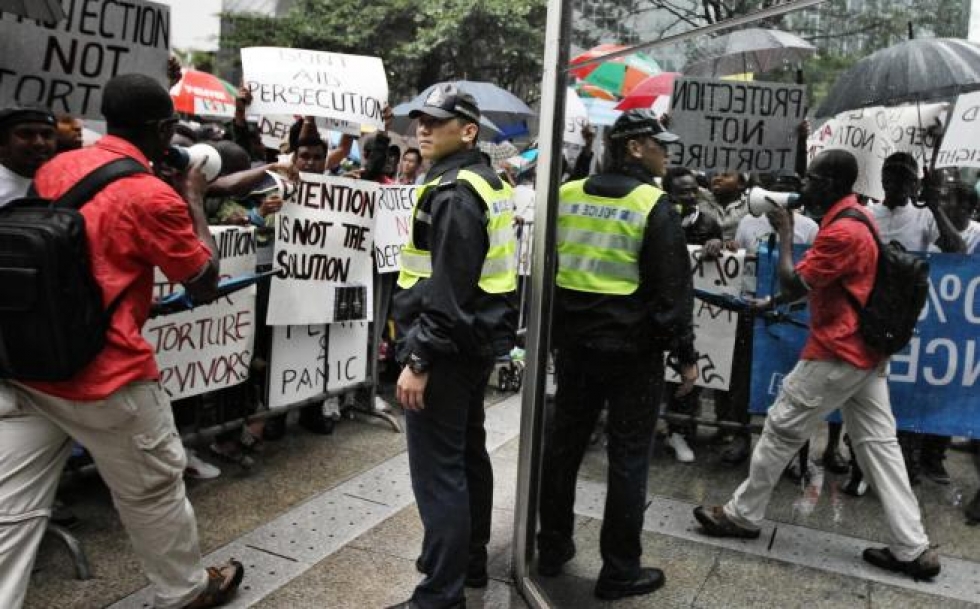
How many refugees enter illegally from China?
Apr 13th, 2015 | Crime, Detention, Immigration, VF Opinion | Comment
“Our experience is that walls do not work … Walls can sometimes divert movement, but will not solve the problem”, said the UNHCR chief Mr. Guterres about the doubling of asylum seekers in Europe in 2014.
Hong Kong experienced a surge in the number of people claiming asylum, with 4,634 new cases lodged between March and December last year. Are these new asylum seekers also new arrivals? Have they been absconding for years and only recently came to know of this avenue of protection?
The CIA World Factbook puts Hong Kong’s land border at 30 km and its maritime border at 733 km, most of which is hard to penetrate undetected. We can only guess, but what is hardly a conjecture is that the controlled entrance points at the airport and land crossings are not the only passages into Hong Kong.
At a time when the authorities are targeting undesirable arrivals at the airport, nothing is said about the considerable number of refugees who enter illegally through other ways – some for the second or third time. It appears that the border with China is rather porous and, for the right price, the trip can be arranged with few hassles and no delay. The choices are various: through the fence, over the hills and by speedboats, known colloquially as ‘ferries’.
From many accounts collected by Vision First over the years, entering without a visa is not a matter of difficulty, but unsurprisingly only a question of money. In 2009 the going rate was 4,000 HK$, while today refugees are charged 12,000 to 15,000 HK$ per person.
Why is it so? Who is involved and who profits from this trade? Certainly it does not seem unreasonable, if the government is really worried about a trend that sees ever more requests for protection, to control what is now an extremely porous border. Or is it not a priority?
Here is the narrative of a refugee who recently arrived from Shenzhen that indicates the ease with which arrangements and journeys are made:
“I couldn’t get a visa with my same name so that is why I had to get illegal entry to Hong Kong. We applied for visa for China. It is not easy. I checked online. I checked with tourist agents. We made a tourist package and China sent us the information. We paid 238 USD per person in our group and they issued a letter that we took to the embassy in (our country).”
“Then we bought one-way air tickets to Guangzhou and stayed at a hotel booked online. The second day we took a train to Shenzhen … We didn’t get a stamp on our passport so we didn’t know how long we could stay in China. We waited there.”
“I asked [people] if there is any way to go from there to Hong Kong. A man gave me his mobile number. I used to talk to him every day. He kept telling me, ‘It is not ready. When it is ready I will let you know.’ He asked for 13,500 HKD each person … Every day I called him and asked when we can leave. He said the sea is dangerous, the cops can come there, so you must wait.”
“Almost one month later he suddenly called, ‘Today you must get ready’ … At 6pm we checked out of the hotel. We called a taxi. I called a Chinese guy who told the taxi driver where to go. I don’t know the location where the guy was waiting for us. He saw us and said, ‘You follow me’. I had never seen him before. We walked … then we stopped in a very dark place. He showed us a place on the water.”
“He told us to go sit (on the shore). There were stones in the shallow water and our feet got wet. Later several rowing boats arrived and took us. They rowed for a while and stopped under some trees, along the seashore. We waited longer. Then one of them took a torch and flicked the light a few times. Suddenly a motorboat appeared from the dark …”
“It was an outboard boat made of wood, about 3m long. It had a big engine. I was very scared. In my life it was the first time I had this experience. I was holding on and did not know what would happen. The driver said, ‘Keep still. Don’t move. Head down. Police there.’ He drove very fast …”
“Suddenly I saw my SIM card activated to Smartone, then I knew we were in Hong Kong. I ask him to stop us there as we were afraid and wanted to get off the boat. But he said, ‘No. Just sit there!’ He stopped further up by a small slope. He walked up and asked us to follow him. He called another man who was 20 meters away.”
“I feel that the border between China and Hong Kong is easy to cross. All the time I was praying in China on the bed because even my friends said it is not easy. I was afraid of crossing the sea, but these people made it very easy. Perhaps I was lucky because others say it is very dangerous …”
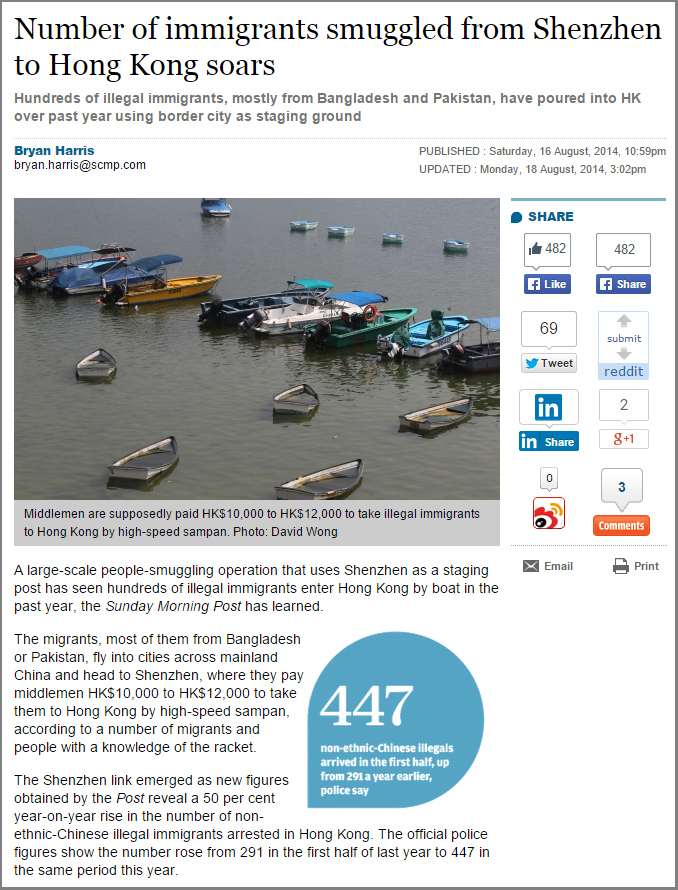
Failing refugees has predictable longterm consequences
Apr 7th, 2015 | Crime, Immigration, Legal, Rejection | Comment
Last week the Liberal Party swung its political machinery into action by petitioning the Security Bureau to tighten visa requirements against South Asian countries to prevent an influx of ‘bogus refugees’. The protest followed the arrival at the end of May of 13 Indians on two non-direct flights, who raised asylum claims with the assistance of the same lawyer, an event reported in the press as suspicious.
Media and official commentary asserted that the arrival of these “13 Indians” was indicative of asylum abuse, rejecting them a priori and without due process, as if refugees fleeing overseas in group was an extraordinary occurrence. Instead was this group stereotyped into suspicious and bogus claimants through the juxtaposition of security, legal and immigration interest that expediently branded them as unwanted and potentially dangerous travelers?
The local media focused on selective information: 1) Immigration is processing over 9000 asylum claims; 2) in 2014 over 4000 new claims were lodged; 3) the top three countries of origin are India, Bangladesh and Pakistan; 4) whereby India accounts for 1760 claimants; 5) visa-free entry from Bangladesh and Pakistan was cancelled three and seven years ago; 6) Indians enjoy visa free entry for periods not exceeding 14 days.
Immigration supported the media coverage ‘admitting that many people abused’ the Unified Screening Mechanism launched in March 2014 following court requirements that cruelty and persecution claims be assessed as well as torture. Immigration produced this data in support of asylum abuse: 1) 166 claimants were arrested in 2014 for working illegally ‘because work is more lucrative than in their countries’; 2) 738 claimants were arrested for theft, assault, drugs and other offenses in 2014; 3) Indian asylum claims rose from 26 a month in 2013 to 75 in 2014; 4) the average asylum claim takes 2.7 years with the longest taking 11 years; 5) asylum claims have risen almost 3 times in the past four years.
An extensive analysis of newspaper article is beyond this blog, though three notable issues deserve being drawn into focus. First, these commentaries say nothing about the unsatisfactiory evolution of asylum policies since 1992 which generated confusion without establishing credible, transparent and expert-driven determinations that truly met high standards of fairness. Over the years, four landmark court rulings caused seismic policy shifts and significant delays which might be worsened by impending “Right to Life” claims under Art. 2 of the Bill of Rights.If past performance is an indication of future results, targeted exploitation of a porous system should not be surprising.
Second, the agency of refugees has been seriously undermined by the administration wrongly, but perhaps intentionally, homogenizing their motivation to escape life-threatening situations with that of irregular migrants primarily motivated by voluntary economic imperatives. In the public discourse an overlap exists between the legal status of asylum seekers, treated primarily as overstayers, and illegal immigrants, a confusion that blurs the boundaries normally defining these two categories.
Third, reflective consideration should be given to the laws, administrative policies and social norms that construct the exclusion spaces in which refugees are compelled to make a living without work rights or adequate welfare assistance. Within this optic, it is neither arduous nor commendable for law enforcement to intercept refugees in construction sites, illegal workshops, underground factories and recycling yards where they scrape an unenviable existence. Should 10,000 claimants abide strictly to laws and policies by panhandling on Hong Kong streets?
This highlights the need for an analysis of the reason why refugees expect to earn a living, in part as a way to regain a sense of self-respect lost during flight. Refugees hope to assume a productive role in society and thereby to improve their wellbeing and social and economic status. As one African refugee remarked, “In Hong Kong I have safety, but I don’t have a good life, because a good life is when you work on your own.”
Are refugees a genuine treat to Hong Kong’s security, stability and prosperity, or does the administration need to reconsider and reformulate a questionable asylum process?
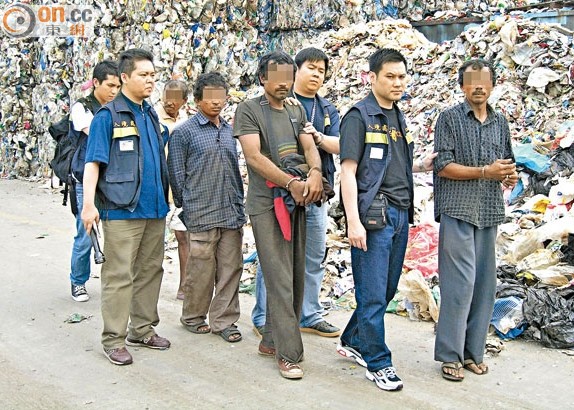
The treatment of refugees by SWD can lead to criminal acts
Mar 31st, 2015 | Crime, Food, Housing, Immigration, Legal, Welfare | Comment
Written by Christopher McNulty
It needs to be considered that the way in which Hong Kong’s Social Welfare Department (SWD) treats refugees can lead to refugees committing criminal acts. This will be explained by defining and discussing the criminological theories of opportunity and labelling and explaining how current SWD policies might lead refugees to commit criminal acts.
Opportunity theory can be defined as, “offenders having inadequate or inappropriate means or opportunities to achieve certain goals relative to other people in society” (White, 2014, p. 71). Considering refugees in Hong Kong using this theory, it can be argued that crime is generated by this type of treatment. For example, if refugees don’t have adequate means of living and opportunities to better themselves through education and work, there is a chance they will try to better themselves through ‘illegal’ activities such as work performed without authorization. As reported in the South China Morning Post, “asylum seekers awaiting the outcome of their claim with the Office of the United Nations High Commissioner for Refugees (UNHCR), recognised refugees awaiting resettlement to another country and torture claimants are banned from doing paid or unpaid work” (Chan, 2013).
Looking at this through opportunity theory, it can take years for refugees to be screened and possibly resettle in another country and, while waiting, they cannot work to better themselves and earn money for their family. Using this example there is a likelihood that if a refugee family needed money for rent, food, clothes or the children’s school and if the only way to achieve this was stealing or working illegally, they would have no choice but to commit criminal acts to meet what most people would agree are basic daily needs, in this case, unmet by the SWD.
Labelling theory can be described as society labelling an individual, which in turn can cause the individual becoming influenced by the label and acting out that labelled behaviour (Holmes, 2012, p. 250). It can be argued that refugees can be stigmatised due to the current system and laws in place. For example, refugees can be seen by the Hong Kong public as being dependant on the SWD and not searching for jobs, as they are not aware of the current government policies which prohibit them from working. This type of stigmatization can cause refugees to be always seen by the public as individuals who are content being dependant on welfare and not wanting to work. This can lead to refugees believing social change will never occur and becoming influenced by the label and turn to conducting criminal acts such as theft and working illegally.
In conclusion, as shown through the criminological perspectives of opportunity and labelling, the current policies of the HK SWD can cause refugees to commit criminal acts due to them not enjoying adequate support and being labelled by the general public as continuously dependant on welfare and not looking for employment. To create a stronger relationship between refugees and the government, refugee policy needs to change to minimise the potential of criminal acts being committed by refugees trying to meet rent payments, purchase essential foodstuffs and making ends meet.
Currently in the media:
